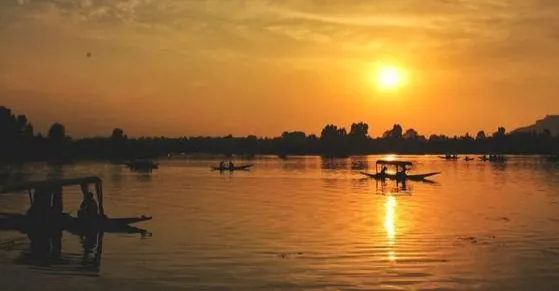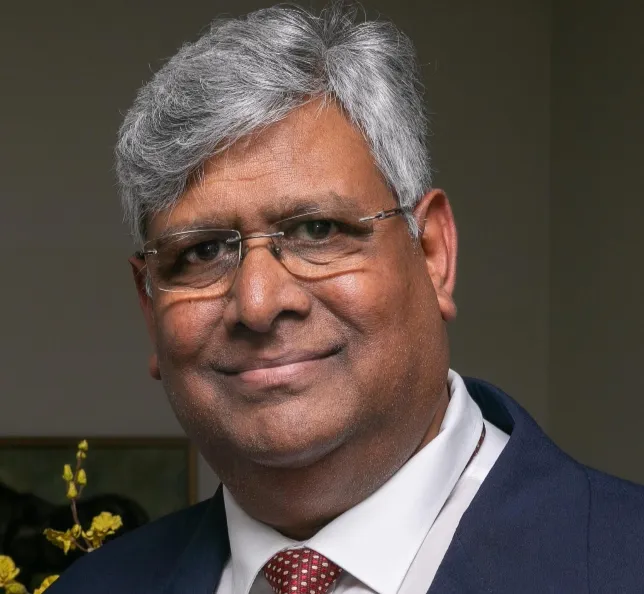
Dal Lake as the sun goes down.
Image: Supplied
THERE are no takers for hotels and houseboats in Kashmir despite discounts of up to 70% following the massacre of 26 non-Muslim tourists at Pahalgam resort on April 22 by Pakistan-sponsored terrorists.
India and Pakistan are on the brink of a wider conflict after India launched strikes on both Pakistan and Pakistan-administered Kashmir, targeting terrorist camps. Residents in the divided Himalayan region, known for its snow-covered peaks, fast-running streams, picturesque lakes and majestic Mughal-era gardens, rely heavily on tourism, but their livelihood has become one of the first victims of the latest hostilities between the nuclear-armed neighbours.
A sharp decline in militancy and a ceasefire that largely held for four years sparked a tourism boom, sending more than three million travellers to the Indian side of Kashmir last year. After the Pahalgam pogrom, there is no telling when tourists will again feel safe to go to the most picturesque high-altitude meadows in the world, lush green grasslands, dense forests, lakes, apple orchards and snow-covered mountain slopes?
My thoughts go back to December 1989.
My wife and I had a choice of adding neighbouring Sri Lanka or Kashmir to our annual holiday in India. The Sri Lankan civil war, particularly in the Tamil stronghold town of Jaffna, involved intense fighting between the Sri Lankan government and the Liberation Tigers of Tamil Eelam. I did not want to get caught up in a battle in Jaffna.
My two sons were then still in single digit ages. Kashmir sounded a better bet, although the history of conflicts and tensions between Indian and Pakistan still hung heavily over a region that must have certainly been front of the queue when God was dishing out scenic beauty. My decision to include Kashmir on the itinerary of our India vacation was inspired by Hindi and Tamil movies.
Before entering the world of journalism, I worked as a lowly-paid advertising salesman and called on all the cinema houses, which booked acres of space for movies. I got free tickets to movie premieres and was taken aback by the magnificent scenery of Kashmir on the silver screen. Cinema owner and my close friend Katy Vagar used to say if it’s true that heaven is where love resides, then Kashmir has to be paradise on earth.
Ironically, while Kashmir is also associated with so much of violence, terror, bloodshed and hatred, it is truly where love seems to bloom with an almost otherworldly grace amidst its snow-capped mountains, crystal-clear lakes, and meadows bursting with flowers that have been used as the backdrop for some of the most iconic tales of romance in Indian cinema.
Kashmir is where the Hindi box-office hits such as Love Story with Rajendra Kumar, Kumar Gaurav and Vijayta Pandit, Aradhana with Sharmila Tagore and Rajesh Khanna, Bobby with Rishi Kapoor and Dimple Kapadia, Kabhi Kabhi, a timeless tale of love, poetry, and destiny, with Amitabh Bachchan and Raakhee Gulzar and Silsia with Amitabh Bachchan and Jaya Bachchan, were shot.
The Tamil movies Roja and Kaatru Veliyidai, both by award-winning director Mani Ratnam, were also largely set in Kashmir. The Tamil movie Wagah featuring Karthi and Aditi Rao Hydari was also extensively filmed in Pahalgam. With Kashmir being a favoured canvas for filmmakers to paint stories of passion, longing, and unbridled love, my wife and I jetted out of Delhi to Srinagar, a city in Indian-administered Jammu and Kashmir, on the morning of December 9, 1989.
As soon as we landed at Srinagar International Airport, our dreams of a week of bliss in paradise on earth quickly ended. Srinagar was under curfew. Why didn’t my trusted travel agent, and brother from another mother, Frank Goveas, of Trimurti Holidays, warn me of this anti-holiday state of affairs?
I soon learnt the curfew had just been enforced the previous evening, on December 8, 1989, after Rubaiya Sayeed, the daughter of the then Indian Home Minister Mufti Mohammad Sayeed, was kidnapped by Kashmiri separatist militants (or should I say terrorists, lest Indian TV news show hosts lambaste me?) as she was travelling in a bus from medical college in Srinagar.
The kidnappers demanded the release of five jailed members of Jammu Kashmir Liberation Front in exchange for her release. Inside the airport, heavily-armed security officials body searched us and went through our possessions with a fine-tooth comb. The batteries in my video camera were removed and discarded in case they were explosive devices. I can still clearly remember the stunned expression on the face of the khaki-coloured sari-clad woman who found my bottle of whiskey in my wife’s bag. It was a look that said, “decent women do not drink”.
It was biting cold. Was I glad the nectar of the Gods was not confiscated. Now this wasn’t a really warm welcome to Kashmir, a veritable Eden on earth and the apotheosis of tourism in India. Our tourist guide soon had us on our way to the edge of Dal Lake where we boarded a shikara, a gondola or taxi boat that is supposed to be enticing and an icon of romance as it is slowly rowed to the houseboats or around the lake.
Any amorousness I had kept for Kashmir was dissipated by the sight of soldiers everywhere and the thought of spending a week under curfew, with only a bottle of almost-impounded Scotch to keep my spirits up. My depressed and despondent mood quickly changed to one of excitement, enthusiasm and eagerness when the shikara pulled up alongside our houseboat named Rose Garden, featuring two lounges, dining areas, and bedrooms with attached bathrooms, which would be our luxurious hotel for the next seven days.
Exquisitely furnished houseboats on the vast Dal Lake boast of the tradition and culture of Kashmir and offer premium services. Away from the city noise, you enjoy the sound of rippling water with a backdrop of the mountain ranges. All the delicious meals on the houseboat are prepared by the owner and his family who live nearby. The interiors of the houseboats are decked with fine Kashmiri handicrafts. The intricately carved balconies and decks enhance the aesthetic appeal of these lavish floating houses.
Looking across the lake, you see vendors selling local goods, like souvenirs, carpets, saffron, dry fruit, Kashmiri carpets and essential oils. You’ll also find shikaras laden with the freshest roses, lilies, daisies, zinnia, and lotus blooms. Yes, I was tricked into buying some fake saffron, made of the hair found on the end of a maize cob, which is dyed red. My wife was more careful and bought a beautiful, genuine Pashmina shawl, which still looks new after 35 years.
Known for its softness, warmth, and luxurious texture, a 100% Pashmina is made from the wool of the Changthangi goat, native to the Himalayan regions of Nepal and India. Silently watching the sun go down, nothing can be more peaceful and tranquil than this experience. Fortunately, it was a dusk to dawn curfew and we were allowed to go into Srinagar city and beyond during the day.
One day we took a two-hour drive to Gulmarg, a hill station, a popular skiing destination within the Himalayas and which is India’s answer to the sights of Switzerland. The cable cars were still being erected then, so we could not go up Apharwat Peak. However, my wife and I trekked as far as we could and took in breathtaking views from the height.
Although it was summer season, it was cold because of the thick snow on the ground and the local tourist guide got us belly-warming kangris. It is like a personal heater; a mud pot filled with red-hot coal embers kept under a pheran, a loose-fitting shirt-like garment made of wool.Kashmir was a memorable destination for me. I wonder if the Rose Garden is still moored on Dal Lake.
Sadly, the attack on the tourists at Pahalgam was also a direct attack on the livelihood of shikara and houseboat owners. The hostilities must end.

Yogin Devan
Image: Supplied
Yogin Devan is a media consultant and social commentator. Share your comments with him on: [email protected]
** The views expressed do not necessarily reflect the views of IOL or Independent Media.